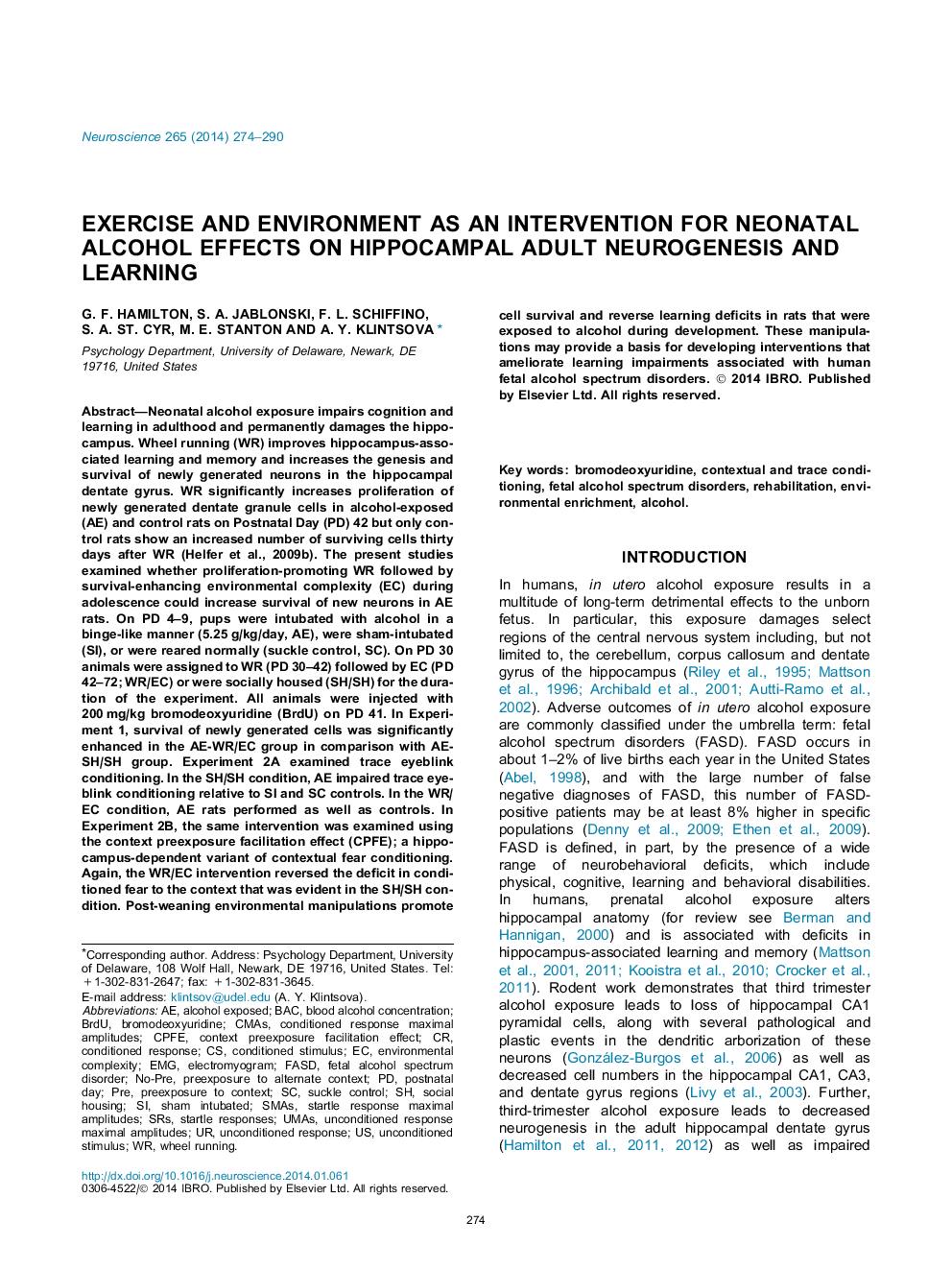| کد مقاله | کد نشریه | سال انتشار | مقاله انگلیسی | نسخه تمام متن |
|---|---|---|---|---|
| 6274024 | 1614811 | 2014 | 17 صفحه PDF | دانلود رایگان |
عنوان انگلیسی مقاله ISI
Exercise and environment as an intervention for neonatal alcohol effects on hippocampal adult neurogenesis and learning
ترجمه فارسی عنوان
ورزش و محیط زیست به عنوان یک مداخله برای اثرات الکل نوزادان در نوروژنز بزرگسالان هیپوکامپ و یادگیری
دانلود مقاله + سفارش ترجمه
دانلود مقاله ISI انگلیسی
رایگان برای ایرانیان
کلمات کلیدی
CMASstartle responsesSMASContext preexposure facilitation effectFASDSRSCPFE - CpFeBAC - LACfetal alcohol spectrum disorder - اختلال طیف الکل جنینEMG - الکترومیوگرافیelectromyogram - الکترومیوگرافیBrdU - بروموداکسی اوریدینbromodeoxyuridine - برومودسوویریدینpostnatal day - روز پس از زایمانBlood alcohol concentration - غلظت الکل خونpre - قبل ازconditioned stimulus - محرک شرطیSocial housing - مسکن اجتماعیconditioned response - پاسخ مشروطEnvironmental complexity - پیچیدگی محیطی
موضوعات مرتبط
علوم زیستی و بیوفناوری
علم عصب شناسی
علوم اعصاب (عمومی)
چکیده انگلیسی
Neonatal alcohol exposure impairs cognition and learning in adulthood and permanently damages the hippocampus. Wheel running (WR) improves hippocampus-associated learning and memory and increases the genesis and survival of newly generated neurons in the hippocampal dentate gyrus. WR significantly increases proliferation of newly generated dentate granule cells in alcohol-exposed (AE) and control rats on Postnatal Day (PD) 42 but only control rats show an increased number of surviving cells thirty days after WR (Helfer et al., 2009b). The present studies examined whether proliferation-promoting WR followed by survival-enhancing environmental complexity (EC) during adolescence could increase survival of new neurons in AE rats. On PD 4-9, pups were intubated with alcohol in a binge-like manner (5.25Â g/kg/day, AE), were sham-intubated (SI), or were reared normally (suckle control, SC). On PD 30 animals were assigned to WR (PD 30-42) followed by EC (PD 42-72; WR/EC) or were socially housed (SH/SH) for the duration of the experiment. All animals were injected with 200Â mg/kg bromodeoxyuridine (BrdU) on PD 41. In Experiment 1, survival of newly generated cells was significantly enhanced in the AE-WR/EC group in comparison with AE-SH/SH group. Experiment 2A examined trace eyeblink conditioning. In the SH/SH condition, AE impaired trace eyeblink conditioning relative to SI and SC controls. In the WR/EC condition, AE rats performed as well as controls. In Experiment 2B, the same intervention was examined using the context preexposure facilitation effect (CPFE); a hippocampus-dependent variant of contextual fear conditioning. Again, the WR/EC intervention reversed the deficit in conditioned fear to the context that was evident in the SH/SH condition. Post-weaning environmental manipulations promote cell survival and reverse learning deficits in rats that were exposed to alcohol during development. These manipulations may provide a basis for developing interventions that ameliorate learning impairments associated with human fetal alcohol spectrum disorders.
ناشر
Database: Elsevier - ScienceDirect (ساینس دایرکت)
Journal: Neuroscience - Volume 265, 18 April 2014, Pages 274-290
Journal: Neuroscience - Volume 265, 18 April 2014, Pages 274-290
نویسندگان
G.F. Hamilton, S.A. Jablonski, F.L. Schiffino, S.A. St. Cyr, M.E. Stanton, A.Y. Klintsova,
